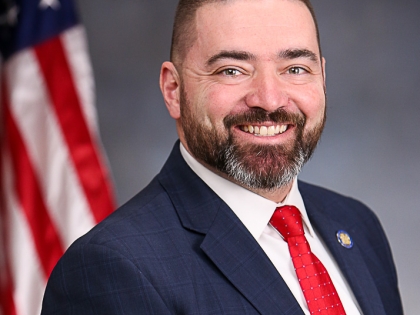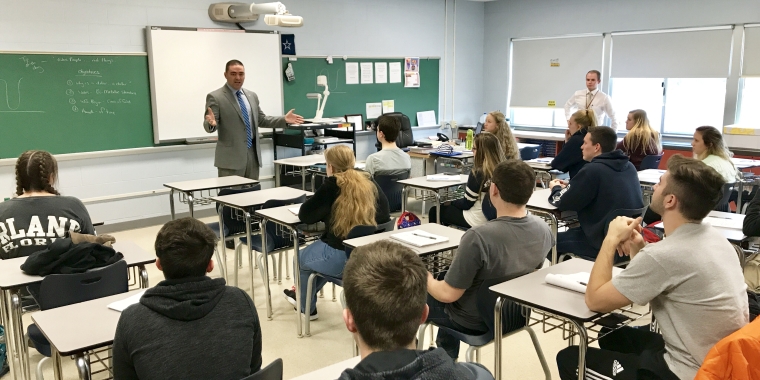
3.5.18 - Senate Passes Comprehensive School Safety Package to Improve Security and Keep Students Safe
March 5, 2018
-
ISSUE:
- School Safety

(ALBANY, NY) On Monday, Sen. Fred Akshar joined his colleagues in voting to pass a package of critical school safety measures that would strengthen security and help keep students safe. The bills increase the ability of schools to hire qualified security personnel; create new state funding mechanisms for infrastructure investments that improve school safety; increase access to school-based mental health services; expand state actions and intelligence coordination to protect schools against attack; and strengthen penalties for crimes on school grounds.
Senator Fred Akshar said, “After listening to local stakeholders in law enforcement and education at our first School Safety Summit last week, I'm proud to join my colleagues in taking the first step toward providing a safer, more secure environment for our students and teachers to learn and teach in our communities across New York. As state legislators, it's incumbent that we act swiftly to make sure we're doing everything we can to protect our children and help provide peace of mind for our community's students, teachers and families. In the coming weeks I'll continue to listen and engage in our community stakeholders to identify needs and act to address them. ”
Increasing the Ability of Schools to Hire Qualified Security Personnel:
- Create a School Resource Officers Education Aid Program and Grant Availability: S7811A and S7810A define the term “school resource officer” to include a retired police officer, retired deputy sheriff, or retired state trooper, or an active duty police officer, deputy sheriff, or state trooper. School districts throughout the state except New York City would be authorized to receive state funding to hire a school resource officer (SRO) or contract with the state, a county, city, town, or village for their services. The officers would be charged with providing improved public safety and/or security on school grounds and be authorized to carry and possess firearms during the course of their duties if licensed to do so.
Sen. Fred Akshar said, “From my 15 years as a member of law enforcement and from listening to current members of law enforcement and school superintendents, it's clear that the SRO program is an obvious and effective way to enhance safety in our schools. These trained officers not only provide security, they build relationships with administrators, staff, students and parents to help identify safety issues, train personnel and resolve conflicts before they become more serious. This program is ripe for expansion so that more schools can access the benefits of this program.”
- Police Officers in New York City Schools: S6798A improves upon the current placement of unarmed resource officers in New York City schools to provide necessary and potentially life-saving security for children, teachers, and administrators. A New York City police officer would be required to be present at public and private schools during instructional hours and for at least one hour before and after school is in session.
- Peace Officer Status for School Resource Officers: S1144A provides retired police officers with peace officer status when they are employed by a school district as a school resource officer.
- Adjusting the Earning Limitations for School Resource Officers: S7791 helps promote the availability of qualified security personnel that could be hired in schools, the bills would increase the earnings limitations for retired police officers while employed by the schools. Earnings would be increased from the current $30,000 per year limit to $50,000 per year.
Improving School Safety with Infrastructure Investments:
- Security Hardware Aid Program: S7790 would provide state education aid to school districts for acquiring safety technology and improving security of their facilities.
- Improve the Smart School Bond Act Allocation Process: S7846 requires the Smart Schools Review Board to meet monthly and approve plans submitted by schools, provide updates on pending applications, and notify schools within seven days of a plan being rejected or modifications being sought. It also requires the state Department of Education, Division of Budget, and State University of New York to develop a process to notify districts of the status of their applications, respond to district status inquires within seven days, and for the Board to pay for approved projects within 30 days.
Senator Fred Akshar said, “After listening to the superintendents at our School Safety Summit and hearing their pleas, we brought their message back to Albany. I pledged to be a loud and energetic voice and I’m proud the say that the entire Senate Republican Majority Conference is calling on the State Education Department to move on the Smart Schools Bond Act funding and get it into the schools where it belongs. Faceless bureaucrats shouldn’t be holding this money up, our children deserve better.”
- Guardians for Schools License Plate: S7847 - A new “Guardians for Schools” license plate would be created to give New Yorkers the ability to take part in a statewide effort to keep children safe from violence. The plate would raise money to help pay for school resource officers, security training, mental health counseling, security cameras and other school building modifications to improve school safety. The bill would create a dedicated fund solely for school safety, supported by the fees paid when motorists choose to purchase a Guardians for Schools license plate from the state Department of Motor Vehicles.
Increasing Access to School-Based Mental Health Services:
- Create a New Mental Health Services Coordinator Aid Program and Grants: S7805 establishes a Mental Health Services Program Coordinator Education Aid Program for the state to reimburse school districts outside the city of New York. Schools would be eligible for $50,000 in state funding for the hiring of a mental health services coordinator. The coordinator is defined in the bill as a mental health services professional, with qualifications determined by regulation by the Commissioner of Education, whose role and responsibility will be to work with students, faculty, and other mental health and health care professionals to identify, report, and address mental health issues that could pose a risk to public safety in any public or non-public school.
- Assess and Improve Mental Health Resources in Schools: S7838 requires the state Department of Education to investigate and report on the number of full and part-time school counselors, school social workers and school psychologists in each school, the ratio of students to the number of school counselors, the ratio of students to the number of school social workers, the ratio of students to the number of school psychologists in each school, and when such staff is working in more than one school. Upon completion of the report, the state must propose how to increase the number of school counselors, school social workers, and school psychologists to meet the nationally accepted ratios, taking into consideration the specific needs of individual school districts and the region in which such school district is located.
Expanding State Action to Protect Schools Against Attack:
- Define School Shootings as Terrorism and Improve Intelligence to Prevent Attacks: S7813A enables individuals to be charged with committing an act of terrorism if they knowingly and unlawfully discharge a firearm within 1,000 feet of a school, a place of worship, a mass gathering of 25 or more people, or in a business of one or more employees and protects such sites under counter-terrorism laws. The bill also codifies the operations of the New York State Intelligence Center and makes it responsible for the collection, integration, receipt, processing, evaluation, analysis, fusing, dissemination, sharing, and maintenance of intelligence information to aid in detecting, preventing, investigating and responding to acts of terrorism, including school shootings. The Center would cooperate with the state Division of Homeland Security among other state, local, and federal government agencies, as well as - for the first time – include schools and the state department of education as part of that collaboration. The bill also requires the establishment of a new Buffalo office to the current fusion centers in Albany and New York City and increase the information-sharing and analysis capabilities of the state.
- Increase Active Shooter Drills: S7845 helps schools better prepare in the event of a school violence incident by requiring that two of the four annual “lock-down drills” conducted by schools be held as “active shooter drills.” Schools can then request School Safety Improvement Teams to provide recommendations on how to conduct lock-down and active shooter drills.
- Upgrade School Safety Improvement Teams: S7832 expands the membership of existing required school safety improvement teams to include representatives of the state Division of Homeland Security, State Police, Department of Criminal Justice Services, Office of General Services and Education Department. It provides for a 120-day response timeline for such teams; provides for on-site examinations of the teams at the request of the school district, BOCES, non-public school, or county vocational and educational board; and allows for the provision of state education aid for the performance of school safety upgrades recommended by a team examination.
Strengthening Penalties for Crimes on School Grounds:
- Protect School Communities From Violent Threats: S2521 expands the existing laws in place to prevent school bomb threats so that other types of threats can be prosecuted as well. Under current law, an individual who threatens a fire, explosion, or release of a hazardous substance on school grounds is guilty of a class D felony of falsely reporting an incident in the first degree. This measure would also make it a felony for someone to issue a threat of intentional acts or a continued course of action of serious physical harm to 10 or more people on school grounds.
- Prevent School Assaults and Abductions: S2881 “Suzanne’s Law” increases the penalties for assault or abductions that take place on school grounds, including nursery schools, and college campuses. Similar to Drug-Free School Zones, the bill would create “Assault- and Abduction-Free School Zones” in which sentences for certain crimes committed against a person on school grounds would be one category higher than existing law specifies.
The bills have been sent to the Assembly.
In the last year alone, the Senate successfully extended a 10 percent increase in building aid for schools to fund additional security measures like door hardening, metal detectors, and other related infrastructure. The Senate also secured $25 million in new funding for non-public schools, day cares, and community centers at risk for hate crimes and $15 million for non-public schools to increase their security. Initiatives like these will continue to be a part of this coming year’s budget negotiations.
Additional safety measures are expected to be unveiled next week as part of the conference’s Security Agenda. The Senate will also be considering the following measures to further enhance school security:
- Increase Weapon Detection Capabilities: In order to increase the ability of schools to detect guns more effectively, the Senate will soon be proposing legislation to introduce scanner technology as an improvement over traditional metal detectors.
- Personal Security Alarms: The Senate will consider a bill establishing school safety standards to provide teachers and other school personnel who have significant contact with students with personal safety alarms to be used in emergency situations. These would be wearable devices that once activated by the pressing of an emergency button alerts first responders to an emergency.
related legislation
Share this Article or Press Release
Newsroom
Go to Newsroom


